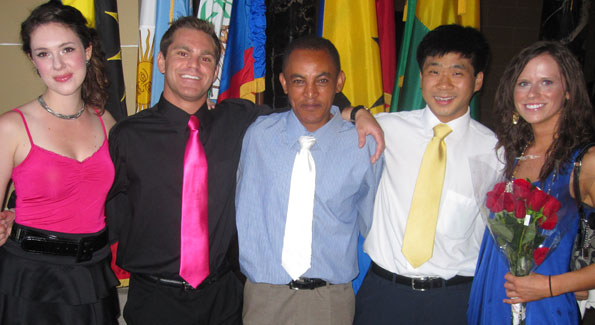Twenty soccer teams, comprised of homeless men from across the country, compete for the national title at the Washington Kastles Stadium from July 30 – 1 August.
By Jane Hess Collins

Washington DC Knights team Jordana Merran (PR coordinator), Brendan Kittredge (coach), Solomon Alemu (soccer player), Jeremy Wong (head coach), Christy Bauckman (coach). Photo by Jane Hess Collins.
Christopher Lodgeson never expected to end up in a homeless shelter. Then he wasn’t sure he’d ever get out. Now, with help from Street Soccer USA (SSUSA), Lodgeson is employed, educated and living on his own. Although he’d grown up in homeless shelters and transitional housing, he excelled in basketball and took advanced-placement courses in high school. When he enrolled at Howard University, Lodgeson started on his path out of poverty.
Then he made a bad decision. Then another one. Falling back into the cycle of his childhood, Lodgeson dropped out of Howard University and found himself living in a homeless shelter in New York City.
Walking into the shelter was tough, Lodgeson said, and hard to explain to someone who has never had to live in one. The experience left him psychologically broken, and he questioned his own worth and value as a productive member of society.
“Your natural instinct is to wall off, be by yourself, stew, be angry, be sad,” he recalled. “But that’s not the time to do that.
”
Having grown up in shelters, Lodgeson knew that the one he was in a good one. Run by HelpUSA, it had an employment center, and best of all for him, a gym. While walking to the gym one evening to play basketball, he chanced upon a group of his fellow shelter residents playing soccer.
Lodgeson had never even kicked a soccer ball. Growing up in New York City, his sports were basketball, football and baseball. He certainly didn’t know Lawrence Cann, the founder of SSUSA. But Cann introduced himself and invited Lodgeson to play. And before long Lodgeson was outfitted in soccer shorts, and learning to dribble and pass with his feet.
That was nearly 18 months ago. Today Lodgeson is completing his associate’s degree in accounting, working at Bloomingdale’s in Manhattan and living on his own. And he gives SSUSA 100 percent of the credit.
SSUSA helped Lodgeson out of the shelter in two ways, he said. First was the practical help the coaches and volunteers gave him of goal setting, resume writing and job search techniques. More importantly was the psychological healing. SSUSA, Lodgeson said, “taught me that I’m a lot stronger than I thought I was, and that if I don’t believe in myself and that I can do it, then I won’t be able to do it.” SSUSA gave him the confidence to get his life back in order. “If I didn’t have the confidence to take those steps, I may not have,” he said.
SSUSA’s volunteer coaches benefit as well. Jeremy Wong, head coach for the DC Knights, the area’s SSUSA soccer team, initially planned to limit his time to coaching when he volunteered with them last fall. “I’ll do the soccer part and other people will handle the social services and job training and all that sort of stuff,” he recalled.
Now it’s the relationships with the homeless men that Wong cherishes the most. He and other volunteer coaches often accompany the players to their case worker visits and Wong celebrates the positive changes he sees in his players. “I thought it was just soccer, but the great thing is that it’s much, much more than that,” he said.
Click here for tickets and other information about the Street Soccer USA Cup. The top players, chosen for achievement on and off the field, will represent the US Men’s and Women’s teams at the 48-nation Homeless World Cup in Rio de Janeiro, Brazil, in September.
Jane Hess Collins is a retired Air Force colonel who writes to inspire people to contribute.
She is also a public speaker, conducts workshops for clients to discover their most intrinsic way to serve, and has established game nights for at-risk families throughout the country.
You can contact her for speaking engagements or workshops at www.getoutandgiveback.com.
